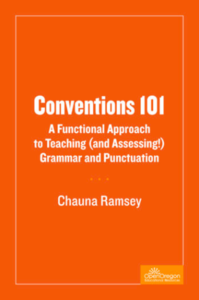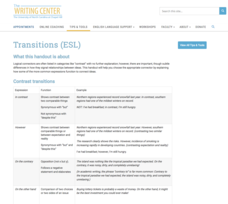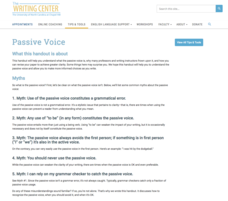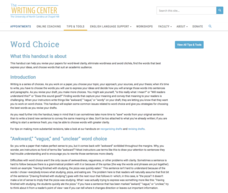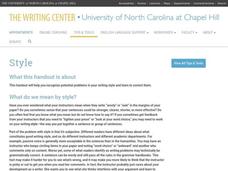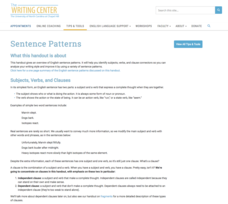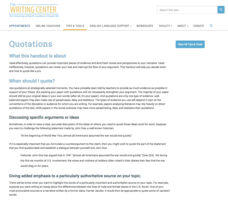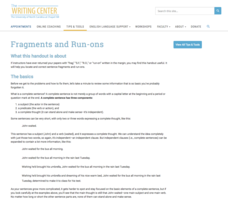NASA
Mapping the Watery Hills and Dales
How does GPS know where everything is located? Pupils read about satellites that are mapping the ocean and the question on how satellites know where they are. Readers discover the workings of the Global Positioning System and create...
University of Minnesota
Writing for Success
You can be a success! Scholars learn skills required for successful writing with a step-by-step process. They begin with the basics of parts of speech, such as indefinite pronouns, and writing a simple sentence. Individuals then build...
University of Victoria
Agreement with Indefinite Pronouns
Why can't they agree? Scholars learn about agreement with indefinite pronouns with online materials. First they learn what indefinite pronouns are as well as examples. They look at examples of indefinite pronouns used in sentences before...
Ereading Worksheets
Figurative Language for Edgar Allen Poe
Are your classes weary of dreary worksheets? Are the learners nearly napping? Thrill them, fill them with delight with an interactive worksheet that asks them to identify the figurative language Edgar Allen Poe uses to add horror and...
Open Oregon Educational Resources
Conventions 101: A Functional Approach to Teaching (and Assessing!) Grammar and Punctuation
Let's eat kids. Let's eat, kids. Commas make a difference! Conventions 101: A Functional Approach to Teaching (and Assessing!) Grammar and Punctuation explains ways to teach the importance and use of conventions. Learners take part in...
Karlstads Universitet
Pronoun Reference and Antecedent Agreement
The concept of pronoun-antecedent agreement is much easier to understand with solid examples. An explanatory presentation provides an overview of pronoun-antecedent agreement, as well as a series of sentences that feature different types...
New York State University
Pronoun-Antecedent Agreement
Nothing ruins a good sentence like a disagreement between a pronoun and its antecedent! Clear up awkward phrasing in your learners' writing with a helpful reference sheet that notes correct and incorrect ways to use singular pronouns.
University of North Carolina
Plagiarism
As many unfortunate journalists have learned, taking someone else's ideas and passing them off as your own is never a good idea. It's called plagiarism—and it's a big deal. Thankfully, a handout helps writers learn how to avoid...
University of North Carolina
Transitions (ESL)
When it comes to comparing and contrasting in an essay, looking at a chart and picking a random transition word may not do the trick. As explained in an informational writing handout, the words writers use to move from one idea to...
University of North Carolina
Passive Voice
Why was the road crossed by the chicken? Because the writer forgot to write in active voice. Many myths surround the use of passive voice. Thankfully, an informative handout explains how to recognize passive voice and when it's okay to...
University of North Carolina
Verb Tenses
Twelve categories of verbs exist in the future tense, ranging from simple present to future perfect progressive, but only three have a place in academic writing. Those three tenses make up the content of an informational handout that...
University of North Carolina
Word Choice
Words matter, particularly in academic writing. Issues such as vague language, wordiness, and cliches make it difficult to get a point across. Part of a larger series to improve writing skills, the handout on word choice shows writers...
University of North Carolina
Style
Just like you choose your clothes to ensure they fit the occasion, you should choose your words deliberately while writing. Style, the main topic of one handout in a series on writing skills, involves choosing words carefully and paying...
University of North Carolina
Sentence Patterns
In an ideal world, sentences in a college-level essay should feature a variety of sentence types. In reality, most papers stick to simple and compound sentences, two of the types a handout on sentence patterns discusses. Part of a larger...
University of North Carolina
Semi-Colons, Colons, and Dashes
Hey teacher, what's that weird thing with a period on top and a comma on the bottom? If you've ever received a question like this, it may be time to review the handout on semi-colons, colons, and dashes. Part of a larger series of...
University of North Carolina
Quotations
According to A.A. Milne, "[A] quotation is a handy thing to have about, saving one the trouble of thinking for oneself." However, as part of a larger series of handouts discusses, quotations also have the ability to enhance a piece of...
University of North Carolina
Gender-Inclusive Language
In the past, if writers weren't sure of a person's gender, they simply used masculine pronouns. Today, however, as a handout on gender-inclusive language explains, writers must choose pronouns carefully. To promote the use of gender...
University of North Carolina
Fragments and Run-ons
English teachers around the world cringe when they come across fragments and run-ons in papers. A handout on these poor imitations of sentences helps bring relief by reviewing the basics of sentence construction and by offering...
University of North Carolina
Commas
Every time you pause while reading, you should insert a comma, right? Not necessarily. Using a comma to indicate a pause is just one of the myths addressed in a handout related to the pesky punctuation mark. After reviewing common...
University of North Carolina
Citation Builder
Does the publication date come before or after the title? Should there be a comma between the location and year? The answer depends on whether you're using the MLA, APA, Chicago,4or CSE/CBE style guide. A citation builder clears up...
University of North Carolina
Articles
English might be a tough language to learn, but at least all words have a specific purpose! A handout from The Writing Center at UNC outlines the purposes of articles in the English language. Discover which types of nouns need articles...
University of North Carolina
Qualifiers
A lot of writers really struggle very much with adding a lot of qualifiers and intensifiers in their writing. Part of a larger series to improve writing skills, a handout on the topic provides tips to help reduce a reliance on these...
University of North Carolina
Modals
If you could have any job in the world, what would it be? Modal verbs such as could and would express possibility, as the installment of a compilation of informational handouts describes. A series of tables help explain the strength,...
University of North Carolina
Latin Terms and Abbreviations
N.B.. cit., n.b., viz., sc., inf. e,g,—these abbreviations frequently appear in academic papers and on works cited lists, but what do they mean? Part of a larger series to improve writing skills, the handout on Latin terms and...






